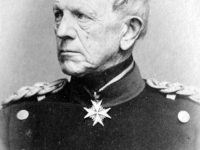Helmuth Karl Bernhard Count von Moltke was a professional soldier and served in the Danish and Prussian army. Through his development of contract tactics, he not only reformed the Prussian military but also set the foundation stones that are still in use in today's armed forces.
Origin and teenage years:
Helmuth Karl Bernhard Graf von Moltke was born on October 26, 1800 in Parchim, the son of the Mecklenburg noble family. His father Friedrich Philipp Victor von Moltke joined the Danish military in 1806 and served alongside Helmut also two of his brothers as a later military role model.
Molke's service in the Danish military:
Due to the good contacts of her father, Helmuth and 2 of his brothers joined the Danish military in the cadet academy in Copenhagen in 1811 as cadets.
After his promotion on January 20, 1818, he became a second lieutenant in the Danish Oldenburg Infantry Regiment in Rendsburg, where he drew attention to himself through his talent and ambition.
The change in the Prussian military:
In order not only to know the military service of the Danish Army, Helmuth asked the Danish King Frederik VI. even a transfer to the Prussian military. With the words: "May it be possible for me at some point in the future to use the abilities that I seek to acquire for the benefit of the King and Denmark," he emphasized his request.
In January 1822 his request was granted and he was released, assuming that he could gain experience in the Prussian army, which he can later bring back in the Danish military.
He served in the Prussian army as a second lieutenant in the 8th Infantry Regiment in Frankfurt on the Oder. From 1823 to 1826 he also attended the General War School, 1833 he got the honor to be appointed to the General Staff, where among others Carl von Clausewitz was one of his mentors.
Moltke's journey in the Ottoman Empire:
In 1835, Moltke was granted a holiday for further education in southeastern Europe. There he became aware of the Ottoman sultan, who asked the Prussian military to lend him Moltke as an instructor for his own military. From 1836 to 1839 Moltke accompanied the Ottoman military and traveled to Constantinople, the Black Sea coast, the Taurus Mountains and the desert of Mesopotamia. In addition, he took part in a campaign against the Kurds in 1838.
In 1837, Moltke traveled with the sultan to the Danubian provinces of the Ottoman Empire. There he was to take over and implement the planning for the fortifications of Silistra, Varna, Shumen and Rustschuk, which should serve as bulwarks against the Russians.
He also accompanied the Ottoman campaign against the Egyptians, up to the defeat on June 24, 1839 at the Battle of Nizip.
In his final travelogue, he formed the sentence:
"It has long been the task of the Western armies to set limits on Ottoman power, and today it seems to be the concern of European politics to give it its existence."
Moltke's service in the General Staff of the Prussian Army:
After his return to Prussia Moltke was promoted to Major, 1846 Adjutant of Prince Karl Heinrich of Prussia in Rome, and from 1856 Adjutant of Crown Prince Friedrich Wilhelm.
On October 29, 1857, he was promoted to Major General and received from 1862 the task of planning a war against Denmark, as the political situation worsened.
On 2 June 1866 was carried out by King William I with the Cabinet Order, the creation of a center for the political and military influences in the form of the General Staff Restructured. Moltke was promoted to general and assigned to the general staff, which authorized him to give orders to the front without consulting the Minister of War.
Through his reform of contract tactics, he contributed significantly to the successes in the wars against Denmark, Austria and France. For his victories in the German-Danish war, he was also awarded the title of Count.
Moltke's contract tactics:
Moltke realized early on that military planning, with the firm implementation of only one option, proved completely inadequate. According to his accumulated experience, a constant planning can only serve until the first encounter of the armies, after which the further course depends on too many variables.
According to his understanding, it was therefore necessary not to strictly stick to a single plan in military planning, but to consider all possibilities. Also, the subordinates are to receive more freedom of action to independently adapt their tactics of the situation quickly without first having to consult with the supervisor.
This tactic is still used today in the german army.
The end of Moltke's life:
On April 20, 1842 Moltke married Marie Burt and Erwarb in Silesia the estate Kreisau as a retirement home. After the early death of his wife in 1868, he had a mausoleum built there.
Moltke himself died on April 24, 1891 in his official residence in Berlin. He was also buried in the mausoleum on Good Kreisau next to his wife.
At the end of World War II, however, his bones were lost.
This post is also available in:
 Deutsch (German)
Deutsch (German)  Français (French)
Français (French)  Italiano (Italian)
Italiano (Italian)  简体中文 (Chinese (Simplified))
简体中文 (Chinese (Simplified))  Русский (Russian)
Русский (Russian)  Español (Spanish)
Español (Spanish)  العربية (Arabic)
العربية (Arabic)














